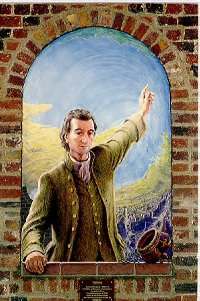See Dissecting Deism Past and Present
French Deism Road to Revolution and Murder
Richard Hooker explains the basis for French Deism and to understand the subject we must note several items:
The use of classical mechanics to explain the operation of the universe eliminated any use for God. This was a broad step to atheism in God being reduced to being a vague philosophical argument.
French philosophers applied this to Christianity further removing God from the culture. While he didn't mention Voltaire, they adopted Aristotle's Prime Mover an idea that "god" set the universe (matter) in motion and it went on it's merry way. Reason and human philosophy was all that was needed and no guidance or input from God was required - in fact any notion of revelation was strongly rejected.
Jean-Jacques Rousseau and his Discourse on Inequality would set the goal for secular violence when the radical French Deists sought the use of government force to remake society - something Nazis, Marxists, fascists, and a lesser degree secular Progressives employ today.
They concocted the Cult of the Supreme Being to replace the Christian Church - then acted worse than the Inquisition.
The French Deists had little to nothing in common with American and English Deism that are closer to liberal Protestantism minus the Trinity. Since the 18th Century secular violence and non-Christian violence has torn Europe and the rest of the world apart.
The rest of from Hooker. Lewis Loflin
Classical Mechanics
The implications of Isaac Newton's physical theories of mechanics,
which treated the universe as if it were a machine (hence the term
"mechanics") built by a creating god yet running on its own principles
independent of the interference of the creating god (though Newton never
denied that God couldn't interfere, just that he didn't), encompassed
much more than physical change and movement.
Soon other areas of
experience came to be regarded as mechanistic and independent of divine
interference: social structures, economics, politics, and so forth. Each
of these areas could be understood and manipulated solely through rational
methods, since they operated through consistent and orderly laws and
principles. More on Isaac Newton here
European Enlightenment
The Philosophes
The philosophers of mid-eighteenth century France developed this
mechanistic view of the universe into a radically revised version of
Christianity they called deism.
Drawing on Newton's description of the
universe as a great clock built by the Creator and then set in motion, the
deists among the philosophes argued that everything, physical motion, human
physiology, politics, society, economics, had its own set of rational
principles established by God which could be understood by human beings
solely by means of their reason.
This meant that the workings of the human
and physical worlds could be understood without having to bring religion,
mysticism, or divinity into the explanation. The Deists were not atheists;
they simply asserted that everything that concerned the physical and human
universes could be comprehended independently of religious concerns or
explanations.
However, Deism encompassed far more than this. For the Deists believed that if God created a rational universe, a universe that could be understood by human reason alone, that must mean that God was rational as well. If God is rational, then God can be understood through the use of reason without recourse to mysticism, superstition, prayer, or even the divinity of Christ. The Deists set out to replace Christianity with its ceremonies, devices, and supernatural aspects with a religion they called "The Cult of the Supreme Being."
Rousseau
The Discourse on Inequality
Historically, this second aspect of Deism was almost as important as
the first in the development of modern European culture. During the second
revolution and reign of terror in France in 1791-1792, the radical
revolutionists attempted to put these Deistic principles into practice.
They renamed Notre Dame cathedral in Paris, "The Temple of Reason," and
went about the countryside attempting to transform Catholic churches into
churches of the "Supreme Being."
The radical revolutionists, of course,
were attempting to remake French society from the ground up, as
Jean-Jacques Rousseau suggested in the Discourse on Inequality. From
changing the calendar and the names of the days to rebuilding the
church into a Deistic church, most of the constructive activities of the
radical leaders of the second revolution and the terror aimed at this goal
of rebuilding society on rational principles.
However, the conversion of
the Catholic church to a "Cult of the Supreme Being" proved to be too
radical for the French countryside, and reaction to this change, among
other things, spelled the end of radical reform.
1996, Richard Hooker
- Islam Versus Deism
- Left vs Right, Montesquieu, Corporatism
- Eastern Roman Empire and Islam
- Philosophies of Islam, Greece, and the West by Turgut Ozal
- Example of Islam and science.
- Maimonides Versus Aristotle and the Jews of Spain, Thirteen Rules
- Handbook on the History of Modern Science
- Pelagius and why he was right
- Islam Versus Judaism and Christianity
- Islam to Deism: Why I became a Deist
Web site Copyright Lewis Loflin, All rights reserved.
If using this material on another site, please provide a link back to my site.

